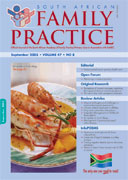CPD: Atypical pathogens and challenges in community-acquired pneumonia.
Abstract
Atypical organisms such as Mycoplasma pneumoniae, Chlamydia pneumoniae, and Legionella pneumophila are implicated in up to 40 percent of cases of community-acquired pneumonia. Antibiotic treatment is empiric and includes coverage for both typical and atypical organisms. Doxycycline, a fluoroquinolone with enhanced activity against Streptococcus pneumoniae, or a macrolide is appropriate for outpatient treatment of immunocompetent adult patients. Hospitalised adults should be treated with cefotaxime or ceftriaxone plus a macrolide, or with a fluoroquinolone alone. The same agents can be used in adult patients in intensive care units, although fluoroquinolone monotherapy is not recommended; ampicillin-sulbactam or piperacillin-tazobactam can be used instead of cefotaxime or ceftriaxone. Outpatient treatment of children two months to five years of age consists of high-dose amoxicillin given for seven to 10 days. A single dose of ceftriaxone can be used in infants when the first dose of antibiotic is likely to be delayed or not absorbed. Older children can be treated with a macrolide. Hospitalised children should be treated with a macrolide plus a beta-lactam inhibitor. In a bioterrorist attack, pulmonary illness may result from the organisms that cause anthrax, plague, or tularaemia. Sudden acute respiratory syndrome begins with a flu-like illness, followed two to seven days later by cough, dyspnoea and, in some instances, acute respiratory distress. (SA Fam Pract 2005;47(8): 14-19) (Reprinted with kind permission from the American Family Physician, 2004;69(7):1699-1706. Copyright © American Academy of Family Physicians) Permission from the AAFP was granted to publish this article in the hardcopy only. Kindly refer to www.aafp.org or subscribe to the hardcopy of South African Family Practice.
Published
2005-09-01
Section
Review Articles
By submitting manuscripts to SAFP, authors of original articles are assigning copyright to the South African Academy of Family Physicians. Copyright of review articles are assigned to the Publisher, Medpharm Publications (Pty) Ltd, unless otherwise specified. Authors may use their own work after publication without written permission, provided they acknowledge the original source. Individuals and academic institutions may freely copy and distribute articles published in SAFP for educational and research purposes without obtaining permission.

